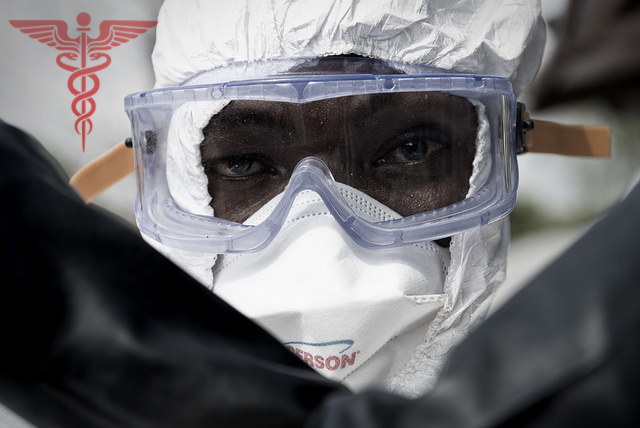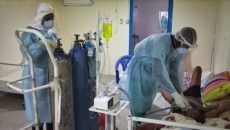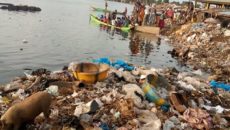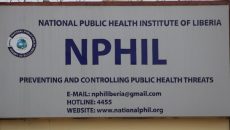A common adage used in Liberia says, “An experienced person is the best teacher.†Another goes: “You will need the old mat to plat a new one.â€
Amid the confirmation of Liberia’s first three Coronavirus cases, the country has become cautious because of the experience in dealing with the deadly Ebola Virus that killed over 4,000 people here. Many people lost their family members, love ones, and the 2014 epidemic contributed to many single parents and orphans across the country.
Both the Coronavirus and Ebola are viruses with many similarities in how they can be prevented. During the Ebola pandemic, while working as a contact tracer, I remember some of the major problems that allowed the virus to spread were misinformation, denial, a poor health system, and a government negligent to follow up on their words in protecting citizens.
Misinformation
In public health, information sharing and feedback mechanisms are very essential to motivate sick persons to visit medical centers and accept checkups. The media, community leaders, and national and international organizations played a bigger role during Ebola. From the inception of Ebola in Liberia, the general message was, “Ebola is here and it kills.â€
This message gave no hope to victims and even pushed health workers and family members away. This actually led to more people dying from curable illnesses, and others who were infected procured over-the-counter drugs and contributed to the spread of the virus.
Denial
Most people disagreed that Ebola existed in Liberia. This disagreement was predicated on the fact that the signs and symptoms of Ebola were similar to existing illnesses – vomiting, diarrhea, muscle pain, and fever.
In addition, people could not easily accept the theory that monkeys, apes, and bats could be carriers of the virus – or that the virus spreads through contact with infected persons, including their dead loved ones. In Liberia, many people are used to washing the bodies of their loved ones before burial.
Community dwellers could not easily accept this new reality until when they got in contact with a persuasive person such as a contact tracer, an active case finder, or a health practitioner who had done sufficient research about the Ebola virus.
Poor Health System
Liberia had not recovered from the broken health infrastructure and the decline of professional health practitioners since the civil crisis in 2003. The emergence of Ebola further exposed weaknesses in the health sector, with limited ambulances, poor health facilities, limited drugs and health workers, and a lack of personal protective equipment.
Liberia had never experienced an epidemic similar to Ebola since its existence, and the outbreak revealed our limited capacity to fight such a contagious disease. As a contact tracer/active case finder, I realized people were transported to health centers but were not given attention and some of them even died on the premises of health centers without being attended to by health workers.
It took a long time through the help of our international partners – the European Union and the African Union – to provide resources. The national government, community leaders, civil society organizations, the media, and citizens became very effective in the middle stage of the pandemic to eliminate Ebola from the country.
Government Negligence
The government never proved worthy of leadership during the Ebola crisis. The entire country was disorganized in terms of instituting and respecting health protocols. The government had no clear plan to manage the information going out to the public and this created distrust, made worse by systemic corruption.
The Ministry of Health increased the distrust through the government’s failure to provide updates to family members whose loved ones were taken to quarantine units. As a contact tracer, I, along with my team, was driven away from some homes in West Point because we could not provide information about family members’ health status.
Furthermore, most of the quarantine centers around the country were not properly equipped to contain Ebola victims and this sent a negative message for those who were still home. When a few quarantine units began releasing people who were not infected with the virus and treated Ebola victims with certificates, this actually contributed to trust-building in the community.
Tackling Coronavirus
This Coronavirus is new to the world, and with Liberia confirming three cases, the country must avoid making the same mistakes as was done in the Ebola fight. The disease is infectious and can cause severe acute respiratory syndrome.
It was first identified in December 2019 in Wuhan, an industrial city in China. Since then, the virus has spread globally and has killed over 10,000 people. The signs and symptoms cannot be limited to fever, cough, shortness of breath, sore throat, and muscle pain. Some progress to severe pneumonia and multi-organ failure. However, the death rate per number of diagnosed cases is estimated to be 3.4% but varies by age and other health conditions.
Misinformation
The government must institute measures to make sure all COVID-19 messages are synchronized and accurate before releasing it to the public. This also includes messages provided by international and national organizations. A lot of information is available on the internet and these cannot be easily controlled and could contain misinformation. To mitigate this, the government must set up a platform that will be used to provide accurate information. There must be hope in the messaging also. We don’t want another “Coronavirus kills and it’s here.â€
Denial
This will have two edges – the government must build trust with community members to ensure they implement all health protocols. Both COVID-19 and Ebola are similar because their signs and symptoms had preexisted before these viruses. All citizens must see this fight as theirs because we can only defeat COVID-19 if we accept to live by the guidelines provided by health authorities.
Poor Health System
With less than a decade and a slump in real GDP that has affected Liberia’s growth rate since the Ebola pandemic, the 2019/2020 fiscal year budget allotment for the health sector is US$81,557,132 out of US$526 million. This amount is higher than the US$69 million that was allotted out of US$582.93 million in 2013/2014 fiscal year.
The country can now boast of the experience we gained from the Ebola crisis and the knowledge transfer during the crisis that enabled us to defeat Ebola.
In spite of these advantages, the government must improve the various health centers with immediate training of health workers, contact tracers, and community leaders, and create awareness in all communities.
All quarantine centers must be accessible with enough medical supplies, trained health practitioners, and personal protective equipment. The government must be responsible to provide timely updates to family members and community leaders on the health status of people who are taken to the quarantine centers.
All those who test negative and victims who are fully recovered must be released to their families with a certificate indicating their wellness. In addition, the government must produce a short video of all quarantine centers to encourage people who are ill to give in for quarantining. The availability of an active and responsive call center with a mobile health team must never be underestimated because this will contribute to building trust in the system.
The Government Must Be Proactive
As in the case of Ebola, the Liberian government reneged on its responsibilities at the inception that contributed to citizens throwing dead bodies on major streets and in dumpsites. In times of crisis, citizens look up to their governments for direction and leadership. The government must get citizens, especially local leaders, to form part of every decision that will affect their communities and quarantine centers must never be built in densely populated communities as was done during the Ebola pandemic in West point.
Liberia is currently faced with economic instability with a rise in commodity prices. All citizens must unite to eliminate Coronavirus and the Liberian government must encourage and negotiate with business owners to import more basic commodities such as rice, vegetable oil, hand sanitizer, and all items that will be needed to fight this menace. With producing countries like China, Japan, and the U.S. also fighting the Coronavirus, we might face a shortage of medical supplies and other provisions to sustain our citizens.
Featured photo by USAID



